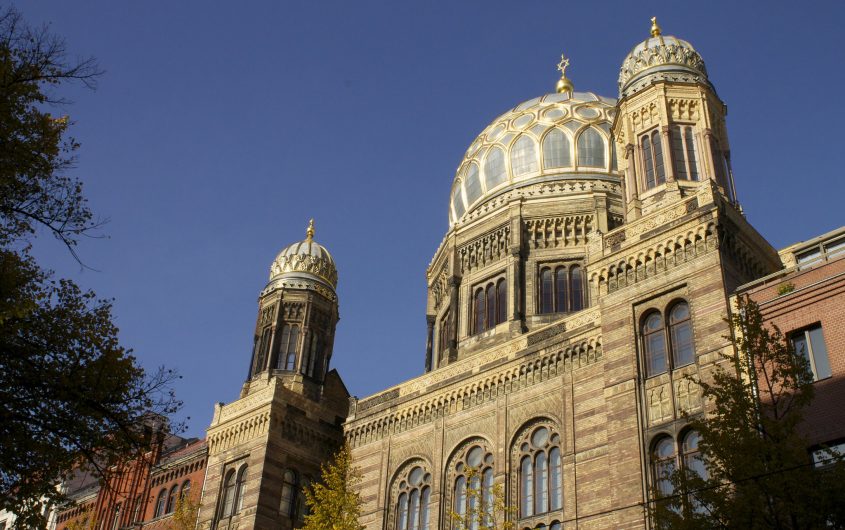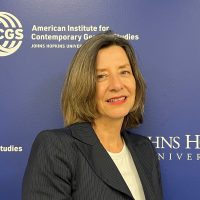
Katherine Price via Flickr
The Central Council of Jews in Germany: A Success Story Against All Odds

Susanne Dieper
Director of Programs and Grants
Susanne Dieper is the Director of Programs and Grants at AICGS. She oversees the Institute’s programs and projects within the three AICGS program areas, manages all AICGS fellowships, and is in charge of grant writing. Her current focus is on issues related to transatlantic relations, immigration and integration, diversity, the next generation of leaders, workforce education, and reconciliation. She develops programs that align with the mission of AICGS to better understand the challenges and choices facing Germany and the United States in a broader global arena.
Previously, Ms. Dieper was in charge of organizational and project management at AICGS as well as human resource development and board of trustees relations. Prior to joining AICGS, she worked in transatlantic exchange programs, language acquisition, as well as the insurance industry in Germany.
Ms. Dieper holds an MBA from Johns Hopkins University with a concentration in International Business and an MA in English Linguistics and Literature, History, and Spanish from the University of Cologne. She has completed course work in nonprofit management at Johns Hopkins University.
__
The Central Council of Jews in Germany (Zentralrat der Juden in Deutschland) turned seventy this summer. Founded in Frankfurt in July 1950, the Central Council represents the interest of the Jewish population in Germany. There are currently circa 100,000 members in 105 Jewish communities across the country. After the Holocaust, its work and efforts predominantly focused on support for Jews who wanted to leave Germany and answering questions about reparations and restitutions, but it also offered support for the reestablishment of Jewish communities in the Federal Republic. Despite continued anti-Semitism among the population in postwar Germany, many Jews settled permanently there. The Central Council facilitated the Jewish settlements and enhanced the cultural and religious traditions of Judaism in Germany, also by rebuilding some of the synagogues that had been destroyed by the Nazis. The Central Council and its members initially faced severe criticism because the World Jewish Congress in 1948 had urged Jews never to set foot on German soil again.
Work and Role
The work of the Central Council is quite remarkable in that it made it possible for Jewish life and religion to return to Germany, in spite of the horrors of the Holocaust. It thus not only served the few Jewish survivors, a disparate group with different backgrounds, nationalities, and traditions, who either somehow remained in Germany, wanted to return to their homeland, or immigrated to Germany after 1950, and aimed to harmonize the various Jewish communities across the nation. But it also, maybe unwittingly, made an extraordinary contribution to Germany’s postwar reputation as a liberal democracy and paved the way for religious and cultural pluralism in Germany. Although that pluralism has expanded over the years through migration, the country’s struggle with a universal acceptance of diversity persists and the question who can be considered to be German is still being posed. Today the Jewish community in Germany continues to grow, in part due to significant immigration by Jews from the former Soviet Union.
The Central Council has also played an important role in defining and influencing Germany’s memory culture, not only regarding the crimes of the Nazis and the building of memorials and museums, but also in the debate and long-lasting discussion about how to commemorate the victims of the regime of the German Democratic Republic. Germany has been keen to avoid the relativization and comparison of the crimes of the Holocaust in connection with the crimes committed by the East German state from 1961 to the fall of the Wall in 1989.
The Central Council’s activities are not limited to Germany. Its international efforts are driven by the mandate that Jews around the world share a responsibility for each other and it is active in its international cooperation with other Jewish organizations. The security and safety of the Jewish communities are the primary goal of this engagement. The Central Council is a member of the European Jewish Congress, the World Jewish Congress, as well as the Conference on Jewish Material Claims against Germany, which represents the claims of Jewish victims of the Nazis and the survivors of the Holocaust.
Seventy Years
The 70th anniversary ceremony of the Central Council was held on September 15, 2020, in Berlin. Chancellor Angela Merkel and the Central Council’s current president, Dr. Josef Schuster, delivered keynote speeches with several German political, religious, and cultural leaders in attendance. Chancellor Merkel emphasized the close and reliable partnership of the Central Council in German politics and society as well as the fact that Jewish life is once again flourishing in Germany. However, she lamented that anti-Semitism and racism are still a worrisome actuality and that insults, threats, and conspiracy theories are often aimed at Jewish citizens. She admonished that this cannot be met with silent acquiescence but requires action. Dr. Schuster underscored the support the Central Council and the Jewish communities receive from the established political parties and a majority of the German population. Nevertheless, he pointed to a persistent uncomfortable feeling among Jews in Germany that often prompts them to hide their religion in public places. He emphasized that more needs to be done to root out the rhetoric of the Nazis that continues to be present.
More needs to be done to root out the rhetoric of the Nazis that continues to be present.
Few people, including its founders, who Dr. Schuster calls “pioneers,” would have thought it possible that the organization would endure for seventy years. But it did just that—against all odds and probably much skepticism—and has continued and enlarged its work and activities. While initially operating mostly outside of the public purview, the Central Council began to increase its official presence in the 1970s and 1980s, which simultaneously led to an internal reflection on Jewish traditions and the future of Judaism in Germany. In 1979, the Central Council founded the Academy for Jewish Studies in Heidelberg with the aim to train Germany’s future rabbis and teachers of religion. As its confidence and significance grew, the Central Council also adopted a more vocal political stance. Many will remember the public opposition to the joint visit by Chancellor Helmut Kohl and President Ronald Reagan at the Bitburg cemetery.
Jewish Life in Germany Today
The Central Council’s presidents, the majority of whom had been born and raised in Germany, have played their unique part in the organization and in Jewish life in Germany, some controversies notwithstanding. The current and 8th president, Dr. Josef Schuster, who also serves as vice president of the World Jewish Congress and the European Jewish Congress, was elected to the post in 2014 and reelected for another four years in 2018. The German government has stood strongly behind the organization and the Jewish communities in Germany throughout postwar history. Both CDU and SPD-led governments and chancellors as well as Germany’s presidents have pursued close relations with the Central Council’s leaders. Despite a consistent and never waning degree of anti-Semitic sentiment in the country (still today every fourth German entertains anti-Semitic thoughts), Jewish life has continued. It has always been under threat, however, not least due to a recent increase in anti-Semitic crimes, predominantly from far-right circles. The German government has pledged to combat this development. In a recent interview, Dr. Schuster said that while Jews in Germany live safely as private citizens, their institutions (schools, synagogues, and the like) require the protection by the state—a phenomenon that was until very recently almost unknown in the United States.
Not in small part due the Central Council efforts, Judaism and Jewish life in Germany are here to stay.
Not in small part due the Central Council efforts, Judaism and Jewish life in Germany are here to stay. During the dedication of the synagogue in Munich on November 9, 2006, former Central Council President Charlotte Knobloch commented that “we Jews are part of this country again, our country” (“Wir Juden sind wieder Teil dieses Landes, unseres Landes”). She also said that “we built here, we will stay here, because we belong here” and we will shape this country. The proportion of Jews living in Germany compared to the overall population is miniscule, but Jewish communities can be found in each of the sixteen federal states and make up 0.12 percent of the population. In addition to the 100,000 Jews who are members of a community supported by the Central Council, an additional 100,000 people of Jewish faith are estimated to be living in Germany.
The Future
The Central Council and its communities and members have persevered, but anti-Semitic crimes have increased and some understandably do not feel like celebrating this milestone. Abraham Lehrer, Vice President of the Central Council and Member of the Board of the Jewish community in Cologne, does not believe that Jews in Germany will ever be able to live without police protection—a bleak but sadly realistic outlook. As Chancellor Merkel and Dr. Schuster noted in their recent speeches, more is needed to root out hate and prevent attacks of any kind on Jewish life in Germany and the non-Jewish German population must play an important part and demonstrate the courage (Zivilcourage) to make this happen. In the meantime, with an agreement signed by the Federal Ministry of the Interior and the Central Council on September 17, 2020, the government is designating an additional €22 million to make the buildings that house Jewish institutions more secure. This came a week before the high holiday of Yom Kippur and almost a year after a right-wing terrorist tried to shoot his way into a synagogue in Halle with the aim of killing as many Jews as possible. A sense of normalcy remains elusive.








